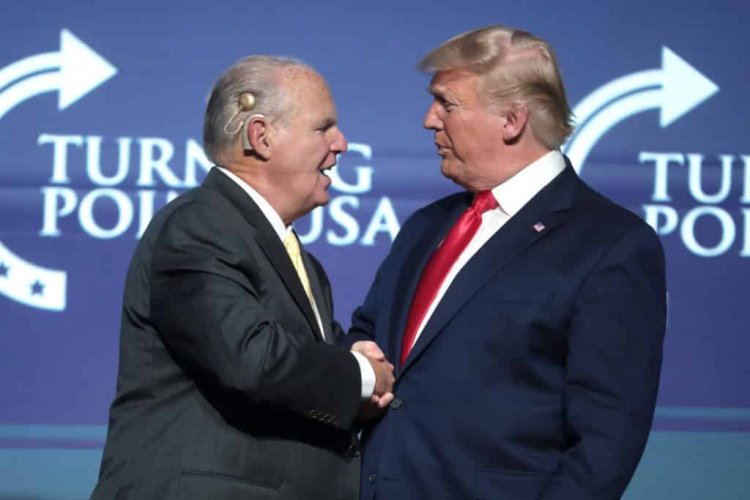Rush Limbaugh, Voice of Conservatism, Florida Resident, Dies Age 70

Rush Limbaugh, the talk radio host who ripped into liberals and laid waste to political correctness with a merry brand of malice that made him one of the most powerful voices on the American right, influencing the rightward push of conservatism and the rise of Donald Trump, died Wednesday. He was 70.
Limbaugh said a year ago that he had lung cancer. His death was announced on his show by his wife, Kathryn.
Unflinchingly conservative, wildly partisan, larger than life, Limbaugh galvanized listeners for more than 30 years with his talent for vituperation and sarcasm.
He called himself an entertainer, and his conversations during his three-hour weekday radio show broadcast on nearly 600 U.S. stations shaped the national political conversation, swaying ordinary Republicans and the direction of their party.
“In my heart and soul, I know I have become the intellectual engine of the conservative movement,” Limbaugh, with typical immodesty, told author Zev Chafets in the 2010 book “Rush Limbaugh: An Army of One.” Forbes magazine estimated his 2018 income at $84 million, ranking him behind only Howard Stern among radio personalities.
Limbaugh took as a badge of honor the title “most dangerous man in America.” He said he was the “truth detector,” the “doctor of democracy,” a “lover of mankind,” a “harmless, lovable little fuzz ball” and an “all-around good guy.” He claimed he had “talent on loan from God.”
Limbaugh often enunciated the Republican platform better and more entertainingly than any party leader, becoming a GOP kingmaker whose endorsement and friendship were sought. Polls consistently found he was regarded as the voice of the party.
His idol, Ronald Reagan, wrote a letter of praise that Limbaugh proudly read on the air in 1992:
"Dear Rush,
"Thanks for all you’re doing to promote Republican and conservative principles. Now that I’ve retired from active politics, I don’t mind that you have become the Number One voice for conservatism in our Country.
"I know the liberals call you “the most dangerous man in America,” but don’t worry about it, they used to say the same thing about me. Keep up the good work. America needs to hear the way things ought to be.”
"Sincerely, Ron"
Above: Former President Ronald Reagan's letter to Limbaugh in 1992.
In 1994, Limbaugh was so widely credited with the first Republican takeover of Congress in 40 years that the GOP made him an honorary member of the new class. During the 2016 presidential primaries, Limbaugh said he realized early on that Trump would be the nominee, and he likened the candidate’s deep connection with his supporters to his own. In a 2018 interview, he conceded Trump is rude but said that is because he is “fearless and willing to fight against the things that no Republican has been willing to fight against.”
Trump, for his part, heaped praise on Limbaugh, and during last year’s State of the Union speech, awarded the broadcaster the Presidential Medal of Freedom, the nation’s highest civilian honor. (The former president’s Mar-a-Lago estate is eight miles down the same Palm Beach boulevard as Limbaugh’s $50 million beachfront expanse.) In honoring Limbaugh at the State of the Union, Trump called his friend “a special man beloved by millions.”
Limbaugh influenced the likes of Sean Hannity, Glenn Beck, Bill O’Reilly and countless other conservative commentators who pushed the boundaries of what passes as acceptable public discourse.
His brand of blunt, no-gray-area debate spread to cable TV, town hall meetings, political rallies and Congress itself, emerging during the battles over health care and the ascent of the tea party movement.
In 2003, Limbaugh admitted an addiction to painkillers and went into rehab. Authorities opened an investigation into alleged “doctor shopping,” saying he received up to 2,000 pills from four doctors over six months.
He ultimately reached a deal with prosecutors in which they agreed to drop the charge if he continued with drug treatment and paid $30,000 toward the cost of the investigation.
He lost his hearing around that time. He said it was from an autoimmune disorder, while his critics said hearing loss is a known side effect of painkiller abuse. He received cochlear implants, which restored his hearing and saved his career.
A portly, cigar-chomping, round-faced figure, Limbaugh was divorced three times, after marrying Roxy Maxine McNeely in 1977, Michelle Sixta in 1983 and Marta Fitzgerald in 1994. He married his fourth wife, the former Kathryn Rogers, in a lavish 2010 ceremony featuring Elton John. He had no children.
Rush Hudson Limbaugh III was born Jan. 12, 1951, in Cape Girardeau, Missouri. His mother was the former Mildred Armstrong, and his father, Rush Limbaugh Jr., was a lawyer.
Rusty, as the younger Limbaugh was known, was chubby and shy, with little interest in school but a passion for broadcasting. He would turn down the radio during St. Louis Cardinals baseball games, offering play-by-play, and gave running commentary during the evening news. By high school, he had snagged a radio job.
Limbaugh dropped out of Southeast Missouri State University for a string of DJ gigs, from his hometown, to McKeesport, Pennsylvania, to Pittsburgh and then Kansas City. Known as Rusty Sharpe and then Jeff Christie on the air, he mostly spun Top 40 hits and sprinkled in glimpses of his wit and conservatism.
“One of the early reasons radio interested me was that I thought it would make me popular,” he once wrote. But he didn’t gain the following he craved and gave up on radio for several years, beginning in 1979, becoming promotions director for baseball’s Kansas City Royals. He ultimately returned to broadcasting, again in Kansas City and then Sacramento, California.
It was there in the early 1980s that Limbaugh really garnered an audience, broadcasting shows dripping with sarcasm and bravado. The stage name was gone. Limbaugh began broadcasting nationally in 1988 from WABC in New York. While his know-it-all commentary quickly gained traction, he was dismayed by his reception in the big city. He thought he would be welcomed by Peter Jennings, Tom Brokaw and Dan Rather.
“I came to New York,” he wrote, “and I immediately became a nothing, a zero.”
Ultimately, Limbaugh moved his radio show to Palm Beach and bought his massive estate. Talkers Magazine, which covers the industry, said Limbaugh had the nation’s largest audience in 2019, with 15 million unique listeners each week.
“When Rush wants to talk to America, all he has to do is grab his microphone. He attracts more listeners with just his voice than the rest of us could ever imagine,” Beck wrote in Time magazine in 2009. “He is simply on another level.”
Limbaugh expounded on his world view in the best-selling books “The Way Things Ought to Be” and “See, I Told You So.” He also hosted a television show in the 1990s before moving exclusively to radio.
“I am a servant of humanity,” Limbaugh replied. “I am in the relentless pursuit of the truth. I actually sit back and think that I’m just so fortunate to have this opportunity to tell people what’s really going on.”
Segments of this story edited and redacted from the AP: Rush Limbaugh, ‘voice of American conservatism,’ has died (apnews.com)

 Local News Staff
Local News Staff 
















